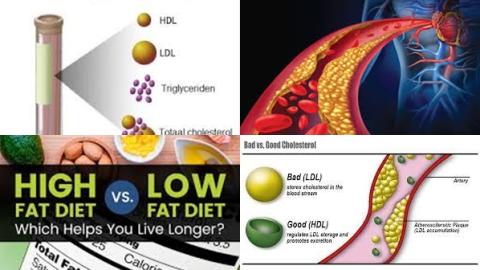
Objectives:
Randomised controlled trials comparing low- versus high-fat diets on cardiometabolic risk factors in people with overweight or obesity have shown inconsistent results, which may be due to the mixed metabolic status of people with excess adiposity. The role of dietary fat manipulation in modifying cardiometabolic indicators in people with overweight or obese without metabolic disturbance is unclear. Therefore, this review article (meta-analysis) has been conducted.
Does a low-fat diet modify cardiometabolic indicators in people who are overweight (BMI>25) or obese (BMI>30) without metabolic disturbance?
Study design:
This review article included 20 RCTs with 2,106 participants.
Results and conclusions:
The investigators found total cholesterol levels in people who are overweight or obese without metabolic disturbance were significantly lower following low-fat diet compared with high-fat diet [WMD = -7.05 mg/dL, 95% CI = -11.30 to -2.80, p = 0.001].
The investigators found LDL-cholesterol levels (bad cholesterol) in people who are overweight or obese without metabolic disturbance were significantly lower following low-fat diet compared with high-fat diet [WMD = -4.41 mg/dL, 95% CI = -7.81 to -1.00, p = 0.011].
The investigators found HDL-cholesterol levels (good cholesterol) in people who are overweight or obese without metabolic disturbance were significantly lower following low-fat diet compared with high-fat diet [WMD = -2.57 mg/dL, 95% CI = -3.85 to -1.28, p 0.001].
The investigators found TAG levels (blood fat levels) in people who are overweight or obese without metabolic disturbance were significantly higher following low-fat diet compared with high-fat diet [WMD = -11.68 mg/dL, 95% CI = 5.90 to 17.45, p 0.001].
The investigators concluded a low-fat diet reduces cholesterol and TAG levels in people with overweight or obesity without metabolic disturbances.
Original title:
Effects of low-fat compared with high-fat diet on cardiometabolic indicators in people with overweight and obesity without overt metabolic disturbance: a systematic review and meta-analysis of randomised controlled trials by Lu M, Wan Y, [...], Li D.
Link:
https://www.ncbi.nlm.nih.gov/pubmed/29212558
Additional information of El Mondo:
Find more information/studies on fat, cholesterol and overweight right here.
A triglyceride (TG, triacylglycerol, TAG or triacylglyceride) is an ester derived from glycerol and three fatty acids. Triglycerides are the main constituents of body fat in humans.
Those with overweight or obesity are advised to follow a diet with maximum 30 En% fat, of which maximum 7 En% saturated fat and minimum 1.5 grams fiber per 100 kcal.
The most easy way to follow a diet with maximum 30 En% fat, of which maximum 7 En% saturated fat and minimum 1.5 grams fiber per 100 kcal is to choose meals/products with maximum 30 En% fat, of which maximum 7 En% saturated fat and minimum 1.5 grams fiber per 100 kcal.
However, the most practical way to follow a diet with maximum 30 En% fat, of which maximum 7 En% saturated fat and minimum 1.5 grams fiber per 100 kcal is all meals/products that you eat on a daily basis should on average contain maximum 30 En% fat, of which maximum 7 En% saturated fat and minimum 1.5 grams fiber per 100 kcal.